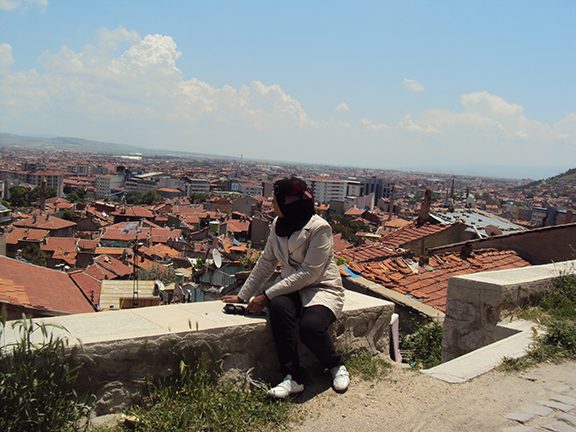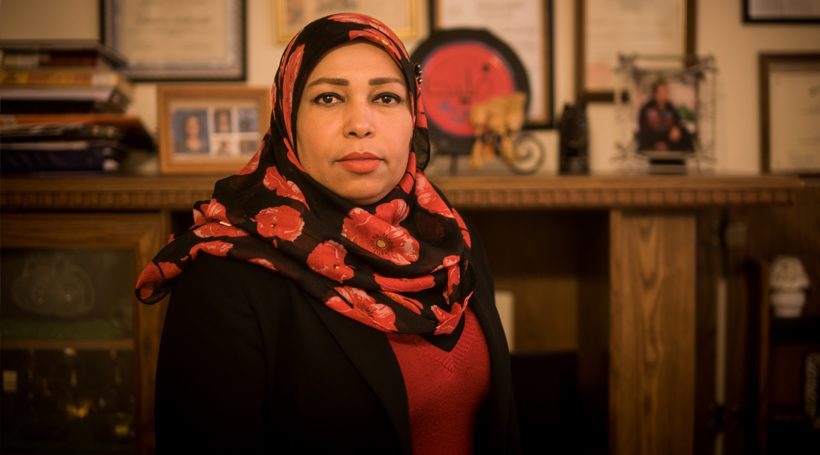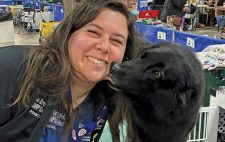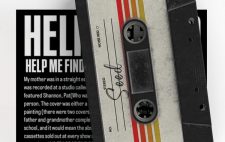Photo: Marcus Boyd Goldbas
To say Faleeha Hassan is courageous is an understatement. In a country where women are relegated to the home, Hassan published poetry. In a place where women are forbidden to travel unsupervised, Hassan traveled alone to the front lines of war. Time and again, she has pushed the boundaries of cultural repression, railed against prejudice and used her pen to make a difference. Now she shares her incredible life and journey from war-torn Iraq to South Jersey in her memoir “War and Me.”
“When I was in my country, I spent almost all my lifetime with war. I have always known war. The Iraqi-Iran War lasted for 8 years followed by the Iraqi-Kurdish conflict. We faced death every day.”
It’s been a long time coming for the person who Oprah once dubbed the “Maya Angelou of Iraq.” Internationally known, Hassan has published over 25 books, plays and short stories which have been translated into 14 languages. Her book of poems, “Breakfast for Butterflies,” was nominated for a Pulitzer Prize. She was named an SJ Magazine “Woman of Excellence” in 2016 and continues to receive recognition for her work. Yet while Hassan’s previous writing has been inspired by her experiences, the memoir is a deep dive into her personal journey.
“I was dreaming to write this memoir for years,” says Hassan. “When I was in my country, I spent almost all my lifetime with war. I have always known war. The Iraqi-Iran War lasted for 8 years followed by the Iraqi-Kurdish conflict. We faced death every day. We suffered from hunger and disease. It affected us all – soldiers, women, children. I felt it was important to share this experience.”
Hassan recalls a courtyard assembly on the first day of middle school. “The principal announced that the government was going to close the school for 10 days, until we could declare victory in the war with Iran,” she says. “But the war continued, and after 10 days, we came back to school. No one was the same.”
She tells of fathers and brothers leaving wives and children during those lean years. She writes of “flour being adulterated with white dirt, fine sand or lime” and dyed sawdust sold as tea. She tells of raids, missing neighbors and looted belongings. Despite such difficult subject matter, the book is also a triumphant testament to Hassan’s resilient spirit. It shows her willingness to dream despite great odds and her ability to turn pain into possibility, hardships into hope.
Hassan took chances, not because she sought adventure but because they were necessary. “I went to the front lines searching for my father,” she recalls. “My mom was ill with heart disease, and she was worried about him on the front lines. I said to myself, I’m not going to watch her die with my father absent. I’m going there to find him. I didn’t think about myself, that maybe I would die or get killed. I just wanted to have some happiness for my mom, some small bit of happy news.” Hassan traveled alone to the border, and despite many challenges, she found her father and brought him home to see her mother.
Her family valued education, which became an inspiration for Hassan. “My parents and grandparents encouraged me to have a good education, to get a degree, to become a teacher.” It was so important that education was a condition of her engagement to marry. She refused to marry someone who would not allow her to complete her doctorate. (Hassan holds a master’s degree in Arabic language from the University of Kufa. Her doctoral studies were interrupted when she later fled her country.)

Writing always came naturally to Hassan, who says she was born a poet. “It’s a gift from God,” she says. “But in my city, not everyone welcomed women poets, especially if you didn’t come from a writing family. Thank God my father encouraged me to publish my book. It was not easy.”
Hassan was the first woman in her city of Najaf, Iraq to publish a book of poetry. It was titled “Because I am a Girl.” The book was controversial not only because it had a female author but because of the cover, which shows a woman without a hijab, the traditional Muslim head scarf. Hassan normally wears a hijab but agreed to the image, knowing she might be shamed for the decision. It didn’t take long.
“I remember there was a guy,” says Hassan. “He was a famous poet in my country. He took the book and held it up in front of maybe 100 or more men and said, Shame on me and poetry. He didn’t even read it. He didn’t even open the book.” As it turned out, this brought greater attention to the book and it sold 5,000 copies. It was the start of Hassan’s writing career.
However, pressure was on Hassan to marry, and she entered into an arranged marriage, which proved to not be a good fit. Her husband was traditional, which was not easy for Hassan. After 4 children, they divorced, and Hassan was again free to teach and write. That came to an end in 2011, when she found her name on a “death list.” At the time, her 2 oldest children had their own lives and families in Najaf. She took her 2 youngest and fled to Turkey, ultimately landing in South Jersey in 2012.
When she arrived here, Hassan didn’t speak English, had no driver’s license, no car and no job. When her daughter became ill with the flu, she was distraught. “I called Catholic Charities and they told me to call 911,” she says. “My issue was, how can I communicate with them? How can I speak to them if I don’t have any English?”
She was determined to learn because, as she says, “language is the bridge between people.” She started with Google translate and also took ESL classes. “I took the bus every day for 3 months,” Hassan says. “When I got a job, I couldn’t go anymore and so I began watching cartoons and movies in English. After that, I started reading children’s books, then young adult books and novels. Now, thank God, I can read and write in English.”
That’s one step in the direction of achieving her greatest success. “My dream job and also my father’s dream job for me was to be a teacher, and I achieved that,” she says. “I spent 24 years teaching Arabic language in my country. I have another dream now, to be a full-time writer. I’m doing everything I can to achieve that dream.”
Today, Hassan has found it isn’t easy being a Muslim woman who wears a headscarf in America, even if her neighbors in Washington Twp. have been accepting and helpful. “It’s not just in the U.S. There is racism everywhere, even in my home country,” Hassan says. She hopes her memoir will help readers learn more about Iraqi culture, the food and traditions, which are woven into her story. “We are not that different, even if we look different. I hope my readers will connect to my story, as a step toward understanding and acceptance.”
As for leaders who may read the memoir, she has a higher hope. “I want a leader to pause to think about the impact on the people before they start a war. Maybe my book can be a message for peace.”














